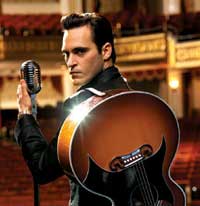

|
Walk The Line
8 out of 10 |
 |
|
Johnny Cash - His Music and His Message Johnny Cash was a man with a dream to play his music and bring his message to as many people as possible. It wasn't an easy journey. He had to overcome people who didn't support him, a drug habit and a marriage that started out well but ended in divorce. It is the perfect material for a movie put into the right hands. "Walk the Line" is the life story of the legendary musician Johnny Cash. It starts from his poor childhood working on his parent’s farm and his love of music. After suffering the tragedy of his brother's death, Cash continued to pursue his music career. Soon Cash got married and was signed to Sun Records best known for having Elvis and Jerry Lee Lewis on it. Cash began to tour with his band and his marriage began to fail. While on tour he met a young woman, June Carter who he at first flirts with and eventually has an affair with. Despite his marriage falling apart Cash continued to be successful at his music. He developed his own style and unique storytelling ability brought him to the forefront of the music scene As a subject for a movie, Johnny Cash's life has many interesting aspects to it. But it's both the direction of James Mangold and acting ability of Joaquin Phoenix and Reece Witherspoon. Mangold's direction is much like a documentary in style and he makes Cash a person that can associate with. Phoenix channels Cash in a realistic and not over the top way. He makes Cash into a troubled but three dimensional character. Witherspoon's Carter is both spunky and interesting. She doesn't make the character come off as someone who weak willed. There is a lot of chemistry between the main characters which makes both characters even more likeable. Both Phoenix and Witherspoon did their own vocals on the movie placing their own signature on Cash/Carter songs. If you are looking for both a good biopic and a good drama with great acting Walk the Line maybe for you.
Film Critic: Steven Scopa
|
|